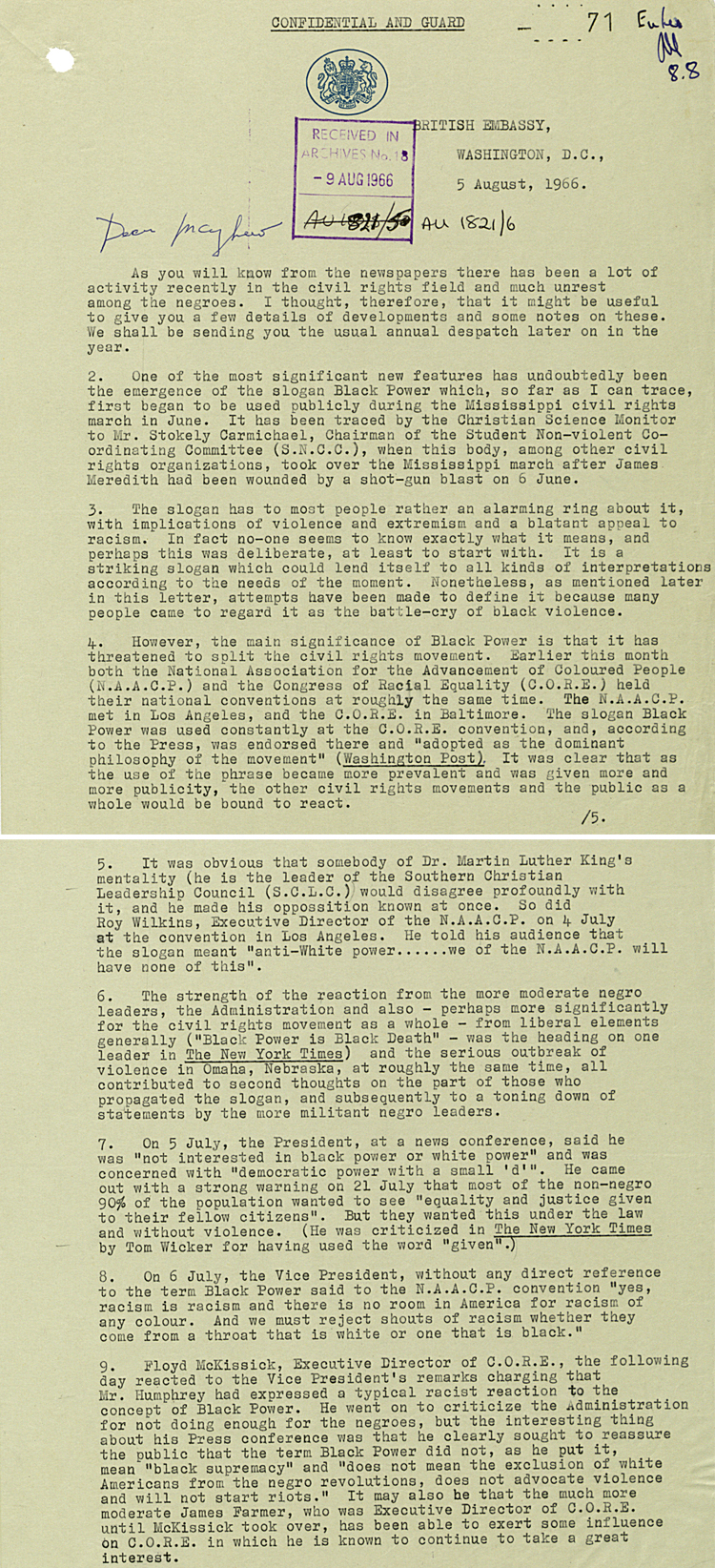
Despatch from British Embassy Washington to Foreign Office on use of “Black power” slogan, 5th August 1966 (FO 371/185052)
Transcript
CONFIDENTIAL AND GUARD
BRITISH EMBASSY,
WASHINGTON, D.C.,
5 August, 1966.
As you will know from the newspapers there has been a lot of activity recently in the civil rights field and much unrest among the negroes. I thought, therefore, that it might be useful to give you a few details of developments and some notes on these. We shall be sending you the usual annual despatch later on in the year.
2. One of the most significant new features has undoubtedly been the emergence of the slogan Black Power which, so far as I can trace, first began to be used publicly during the Mississippi civil rights march in June. It has been traced by the Christian Science Monitor to Mr. Stokely Carmichael, Chairman of the Student Non-violent Coordinating Committee (S.N.C.C.), when this body, among other civil rights organizations, took over the Mississippi march after James Meredith had been wounded by a shot-gun blast on 6 June.
3. The slogan has to most people rather an alarming ring about it, with implications of violence and extremism and a blatant appeal to racism. In fact no-one seems to know exactly what it means, and perhaps this was deliberate, at least to start with. It is a striking slogan which could lend itself to all kinds of interpretations according to the needs of the moment. Nonetheless, as mentioned later in this letter, attempts have been made to define it because many people came to regard it as the battle-cry of black violence.
4. However, the main significance of Black Power is that it has threatened to split the civil rights movement. Earlier this month both the National Association for the Advancement of Coloured People (N.A.A.C.P.) and the Congress of Racial Equality (C.O.R.E.) held their national conventions at roughly the same time. The N.A.A.C.P. met in Los Angeles, and the C.O.R.E. in Baltimore. The slogan Black Power was used constantly at the C.O.R.E. convention, and, according to the Press, was endorsed there and “adopted as the dominant philosophy of the movement” (Washington Post). It was clear that as the use of the phrase became more prevalent and was given more and more publicity, the other civil rights movements and the public as a whole would be bound to react.
5. It was obvious that somebody of Dr. Martin Luther King’s mentality (he is the leader of the Southern Christian Leadership Council (S.C.L.C.) would disagree profoundly with it, and he made his oppossition known at once. So did Roy Wilkins, Executive Director of the N.A.A.C.P. on 4 July at the convention in Los Angeles. He told his audience that the slogan meant “anti-White power……we of the N.A.A.C.P. will have none of this”.
6. The strength of the reaction from the more moderate negro leaders, the Administration and also – perhaps more significantly for the civil rights movement as a whole – from liberal elements generally (Black Power is Black Death” – was the heading on one leader in The New York Times) and the serious outbreak of violence in Omaha, Nebraska, at roughly the same time, all contributed to second thoughts on the part of those who propagated the slogan, and subsequently to a toning down of statements by the more militant negro leaders.
7. On 5 July, the President, at a news conference, said he was “not interested in black power or white power” and was concerned with “democratic power with a small ‘d’ “. He came out with a strong warning on 21 July that most of the non-negro 90% of the population wanted to see “equality and justice given to their fellow citizens”. But they wanted this under the law and without violence. (He was criticized in The New York Times by Tom Wicker for having used the word “given”.)
8. On 6 July, the Vice President, without any direct reference to the term Black Power said to the N.A.A.C.P. convention “yes, racism is racism and there is no room in America for racism of any colour. And we must reject shouts of racism whether they come from a throat that is white or one that is black.”
9. Floyd McKissick, Executive Director of C.O.R.E., the following day reacted to the Vice President’s remarks charging that Mr. Humphrey had expressed a typical racist reaction to the concept of Black Power. He went on to criticize the Administration for not doing enough for the negroes, but the interesting thing about his Press conference was that he clearly sought to reassure the public that the term Black Power did not, as he put it, mean “black supremacy” and “does not mean the exclusion of white Americans from the negro revolutions, does not advocate violence and will not start riots.” It may also be that the much more moderate James Farmer, who was Executive Director of C.O.R.E. until McKissick took over, has been able to exert some influence on C.O.R.E. in which he is known to continue to take a great interest.
